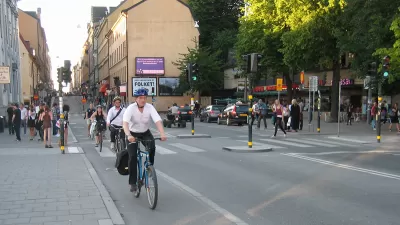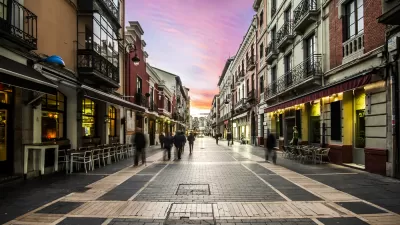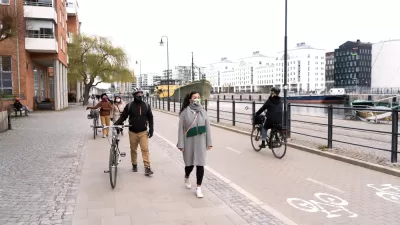Rather than trying to meet all of a community's needs within a one-minute radius, Sweden's Street Moves pilot program gives residents the power to decide how street space gets used.

Move over, "15-minute city," writes Feargus O'Sullivan for Bloomberg. Sweden is pioneering the "one-minute city," a hyper-local vision inspired by the push for decentralizing urban services and creating dense, walkable communities where residents can find almost everything they need within minutes.
Locally-focused schemes such as the 15-minute city and Barcelona's famous superblocks gained steam in 2020 as shelter-in-place orders made people hyper-aware of their immediate neighborhoods and emphasized the need for locally available services and local infrastructure that improves quality of life. Sweden's approach focuses even more closely on "the space outside your front door — and that of your neighbors adjacent and opposite," according to Dan Hill, director of strategic design for Vinnova, Sweden's national innovation agency.
The project, dubbed Street Moves, is being piloted in four sites around Stockholm, where residents can decide how street space is used and allocated through community workshops and consultations. The goal isn't to make everything available within one minute, but rather to reimagine the patches of street immediately outside the home as "critical connecting spaces for communities" and not just "places to move and store cars." If successful, Sweden plans to implement the program on every street in the country by 2030.
FULL STORY: Make Way for the ‘One-Minute City’

Planetizen Federal Action Tracker
A weekly monitor of how Trump’s orders and actions are impacting planners and planning in America.

San Francisco's School District Spent $105M To Build Affordable Housing for Teachers — And That's Just the Beginning
SFUSD joins a growing list of school districts using their land holdings to address housing affordability challenges faced by their own employees.

The Tiny, Adorable $7,000 Car Turning Japan Onto EVs
The single seat Mibot charges from a regular plug as quickly as an iPad, and is about half the price of an average EV.

Seattle's Plan for Adopting Driverless Cars
Equity, safety, accessibility and affordability are front of mind as the city prepares for robotaxis and other autonomous vehicles.

As Trump Phases Out FEMA, Is It Time to Flee the Floodplains?
With less federal funding available for disaster relief efforts, the need to relocate at-risk communities is more urgent than ever.

With Protected Lanes, 460% More People Commute by Bike
For those needing more ammo, more data proving what we already knew is here.
Urban Design for Planners 1: Software Tools
This six-course series explores essential urban design concepts using open source software and equips planners with the tools they need to participate fully in the urban design process.
Planning for Universal Design
Learn the tools for implementing Universal Design in planning regulations.
Smith Gee Studio
City of Charlotte
City of Camden Redevelopment Agency
City of Astoria
Transportation Research & Education Center (TREC) at Portland State University
US High Speed Rail Association
City of Camden Redevelopment Agency
Municipality of Princeton (NJ)





























